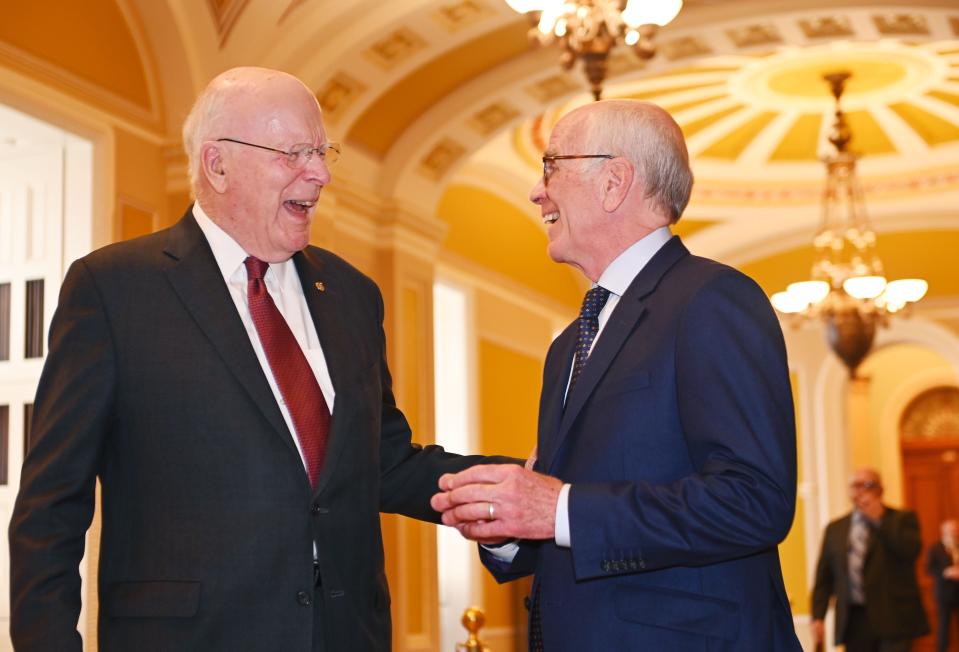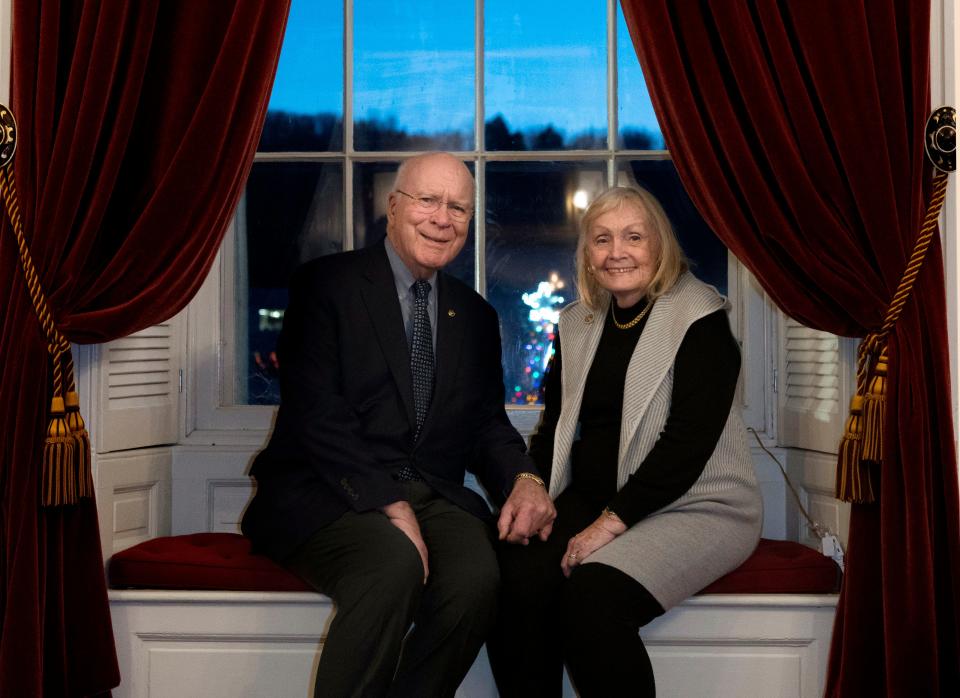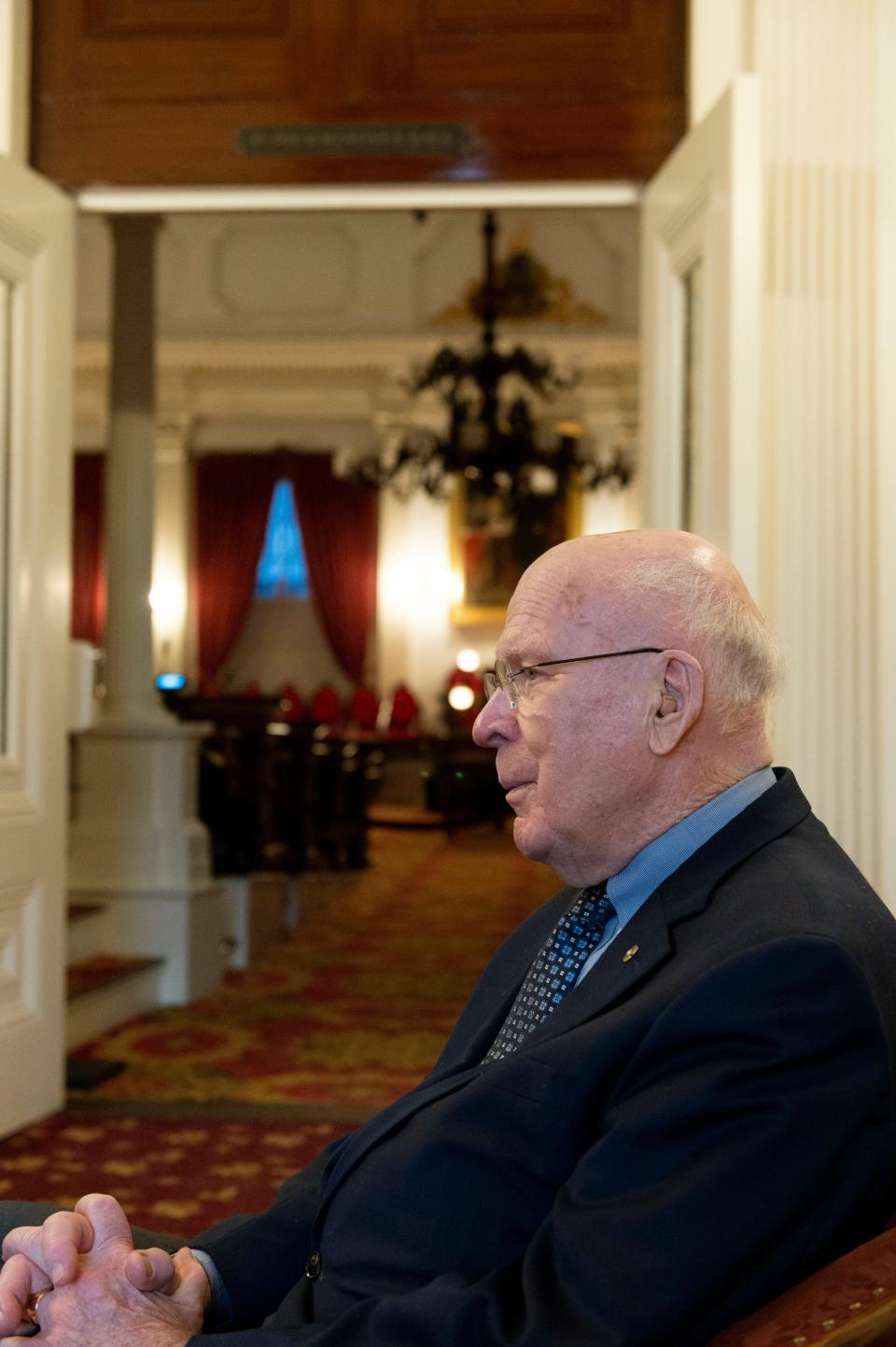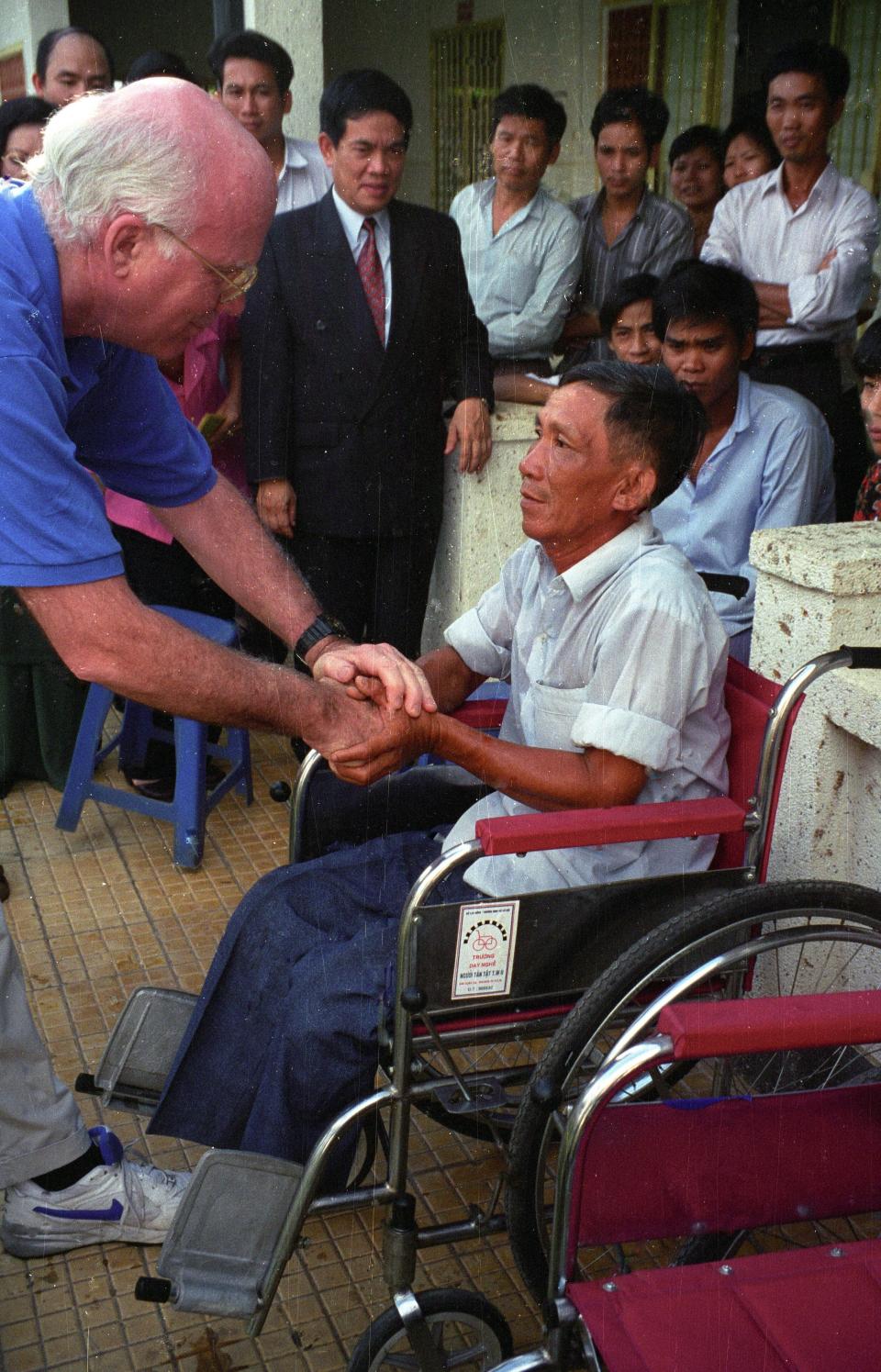Patrick Leahy's farewell: A Vermont senator's nearly five decades in Washington
- Oops!Something went wrong.Please try again later.
- Oops!Something went wrong.Please try again later.
After 48 years representing Vermont in the U.S. Senate, Sen. Patrick Leahy performed his final official act in Vermont on Dec. 10 at the Vermont Statehouse – the same building where, in 1974, he had first announced that he was running for the office despite the unlikely odds.
At the recent event, Leahy joined Sen. Bernie Sanders and Senator-elect Peter Welch in awarding nominations to select high school students from across the state for entry into military schools and academies. On Tuesday, Jan. 3, Leahy closed his career by swearing in Peter Welch as his successor in the U.S. Senate.
In an interview following the Statehouse event, Leahy shared some memorable emotional moments from his long career in public service and spoke about topics ranging from key legislation he initiated, the people who inspired him to run and remain in the Senate, and even the food that sustained him on long days and nights at work.

Before Leahy talked bigger picture topics, he was first asked about food because food connects people. The senator clearly takes pride in looking for what people — friends or adversaries — have in common and for ways to break the ice to open communications. In his memoir The Road Taken, he noted that when he was Chittenden County State’s Attorney, he was able to cope with his tight schedule of researching and writing briefs through the night, arguing his cases in court during the day, and then joining his wife and life partner Marcelle and their three children daily for dinner.
“I could manage that schedule then, as long as I had my coffee and chocolate chip cookies — Marcelle’s cookies!” Leahy said.
The Q and A that follows was edited for length and clarity.
Free Press: What food and drink sustained you when you were in the Senate?
Sen. Leahy: Well, the food in the Senate dining room is not going to sustain anybody. I was better off when I could get home to Marcelle. Sometimes, just to save time or try to spare her, I’d bring my lunch from home in my briefcase and eat it at my desk as I worked. I grew up in a family where my mother was first generation Italian American. My father’s family, the Leahys, have been here since the mid-1800s. My father said, ‘You know Patrick. You’ve never grown up eating Irish food or Italian food. Count your blessings.’ I don’t know about the Irish food but, as Marcelle knows, I have an inclination toward Italian food, especially Northern Italian food; we visit our relatives there. It’s all about Mangia! Mangia!

FP: In what major ways has Vermont changed since you first became a U.S. Senator? And in what ways has the country changed? How does your legacy connect to those changes?
Leahy: That’s interesting. I’ve been thinking of something like that. When I first announced that I was running for the U.S. Senate, I announced right here in the Statehouse, with my parents and Marcelle’s parents here. I was a 33-year-old state’s attorney. In Vermont, we never had elected anyone under age 50. Vermont had not elected a non-Republican since 1856. Certainly, Vermont had never elected a Catholic. I was a 33-year-old Catholic Democrat. And the question I kept being asked was, ‘Okay kid. You got your nomination. Now what are you going to do next year?’ I was going to practice law. Marcelle, especially, was behind me to run. I campaigned by trying to reach out to everybody. After I won, I reached out to Vermont Republican lawmakers and Republican governors. I’d say, ‘I know you didn’t vote for me, but we all want what’s best for Vermont. If I can help with anything, just call me, and I’ll try to help.”
At the time I entered the Senate, Vermont was third smallest state in population in the union; now it’s second. In the U.S. Senate, we’re all equal, all 100 of us. So, there are lots of things I can do. I made it a point to first get on the Agriculture Committee and, then as soon as I could, on Appropriations. And then the Judiciary Committee, with issues that interested me since the time I was state’s attorney. I could do a lot of things for Vermont. I put in the first toll-free phone system. I remember being asked why I’d open the doors for constituents to keep calling me. I wanted to hear from Vermonters. And I had to pay for it myself for the first two months, because it was so unusual a budget request, until the Senate agreed to pay for it.
Once elected, I tried to spend 8 – 10 days a month in Vermont at different times over the month. I went all over the state to ask people, ‘What’s on your mind?’ And I kept that up. It was a very close reelection in 1980, when Reagan and the Republicans swept Congress. I was one of 12 Democratic senators who were targeted. I was one of two who made it through, along with Gary Hart from Colorado. We both had done the same thing. We had spent time in our states. After that the elections were never close. My father said, close to the first election day, ‘Patrick, it’s better to win by one vote than lose by a landslide.’ On my next election in 1986, my Dad was no longer with us. But I won by an overwhelming landslide. My campaign manager toasted him on election night, ‘Howard Leahy, here’s your landslide.’

FP: I was going to ask you about the people who have worked as your staff over the years. I’m sure you can name so many as being helpful. Are there one or two staff members who championed a piece of legislation that meant a great deal to you? Or staff who have had some memorable interactions with constituents or the public? And what proportion of your staff are from Vermont?
Leahy: We always hire the best person for the position. It helps if they are Vermonters. In the Vermont office, they are all Vermonters — and I’ve hired the best people in Vermont to represent me. Here in the room with us is John Tracy, my long-time Vermont state director. Combined with his prior experience in the Vermont Legislature, followed by five years as our office field representative before assuming the state director role, John has met and helped myriad Vermonters and Vermont communities on a wide variety of issues. And Michelle Monroe who is here too, writes me this wonderful press briefing every day. She ties people and events to Vermont. I thought I knew Vermont history. But I’ve learned so much more about Vermont from her. And that’s a wonderful thing. We have staff who work very, very hard on everything.
In the Senate office in D.C., sometimes you need to have specialized skills or experience in certain areas, like dealing with highly classified matters. But even there we’ve had Vermonters spend two or three years working in other positions, and then they are ready to handle it. Many have gone on to other jobs after they’ve worked in the Vermont office.
Tim Rieser, my long-time staff member on the Foreign Ops Subcommittee, is from Vermont and has worked very, very closely with me on land mines and using war victim funds for Vietnamese people; he helped me open the relations we now have with Vietnam. Tim remembers his first trip over there, when we didn’t have relations. He had introduced me to Bobby Muller, a Vietnam veteran. Bobby was head of the Vietnam Veterans of America, and he was in a wheelchair. He was paralyzed from his injuries in the war. He asked me to ban land mines and provide medical equipment to the people of Vietnam who were seriously injured from land mines. He couldn’t even get the sentence out when I said, ‘Yes, I’ll work with you.’ I was the only Vermonter who had ever voted to end the war in Vietnam and that vote won by a one- point margin. So, I spoke to President George H.W. Bush about making a trip to Vietnam to open relations by allocating war victims funds through the Vietnam Veterans of America Foundation, and he said, ‘That sounds good.” Jim Baker, then secretary of state, was at the White House meeting and agreed. I said there was someone at the State Department who opposed this approach. But I got the president to support it. He said, ‘Jimmy,’— I never heard anyone call Baker ‘Jimmy’ before — get him on the phone.’ The State Department official didn’t know he was on speaker phone. Poor guy! He said that it was Leahy’s idea and he thought it was a terrible one. President Bush said, ‘Okay, I have somebody here who thinks it’s a great idea.’

I brought a bipartisan delegation to Vietnam, as I always do whenever I bring a delegation. We were in Vietnam with many injured Vietnamese meeting us and listening to us speak. There was a legless man there and I was asked to pick him up and place him in a wheelchair that we were giving him. Marcelle told me how to best lift him without breaking his frail bones. He was staring at me the whole time. He lost his legs from an American land mine. And here was a 6-foot tall American. I picked him up and put him in the wheelchair and he was staring at me all the time. I’m thinking he must hate me. Then he reaches out and grabs my shirt and pulls me down and kisses me.
The second thing that happened was that Sen. John Glenn (D, OH) – who was a caring but not an emotional guy – had a similar experience and teared up. Marcelle, remember what John said on the bus on the way back to the hotel? Marcelle said without hesitation, ‘After what we’ve seen, if anyone complains I’m going to throw them off the bus!’ When we returned, I told President Bush about our trip, and he also had a visible emotional reaction.
And then we were going to clean up Agent Orange. We were going to give a huge amount of money. John Tracy had fought the war in Vietnam and his helicopter crashed at one point in the jungles. He had been stationed in Da Nang. John was almost killed by a sniper in Da Nang.
John came with me to Vietnam. It was the first time he had been back to Vietnam. And an army general was there and I was telling him John was here with me. The feneral gets off the platform, finds John in the crowd, and says, ‘Mr. Tracy.’ Everything stopped as soon as he said those words. He walks up to John and stands at attention and salutes him. John, would you say that was emotional?
And then we passed legislation to ban the export and use of land mines. This was the first law in the world – anywhere. Other countries have adopted laws banning land mines, and they have Leahy in their names.
And then, for other legislation back here, we spent time sitting at farmers’ tables. There were many organic farmers I talked with. They talked about big agricultural manufacturers who promoted their products as organic in nature. So, I wrote the first organic farm bill, providing funds for organic farmers. I think last year it was $65 billion nationwide. The legislation allows the use of food stamps in farmers markets and in school lunch programs. Marcelle and I go to the schools and sit with the kids.
Anyway, I had such wonderful opportunities to do something and – ‘Oh, look outside the window, the lights just came on the (Statehouse) Christmas tree!’ - and I think I’m motivated a lot by the fact that I wasn’t supposed to be here in the first place, as a 33-year-old kid in a heavily Republican state and I’m on the Democratic ticket. I was in a very close reelection, too, that I wasn’t expected to win. I am here, and I am taking advantage of every second that I’m here. I want to make it all worthwhile. Every year, something different comes up that people haven’t done anything about it. I say, ‘Let’s take it on.’ And with exceptional staff, why not use the opportunity?
And then a few years ago I said to my son — our family always makes decisions together — I think it’s time to go home. The national syndicated editorial cartoonists did this cartoon, with these two farmers at dusk and they’re sitting and talking. And up in the sky the Batman symbol appears. The caption was, ‘Yep. I guess that’s the Bat signal telling Senator Leahy to come home.’
FP: You said that then President John F. Kennedy inspired you to enter politics. He was bright, eloquent, young, Catholic, Irish and, most notably, hopeful. If you were that same 33-year old Pat Leahy today, who would be the person inspiring you to enter politics?
Leahy: I worry about some of the people I serve with. I am inspired by Barack Obama. He suffered impossible odds. He was accused of not being an American, which of course he is. And he faced such racist slurs. And still he served with dignity. That would certainly inspire me. John Lewis, who I got to know, really, really inspired me a lot; I loved him. I was a big supporter of Robert Kennedy - he inspired me.
But there are lots of people in Vermont. My parents inspired me. My mother faced bias and never showed bias to others. My father went to get jobs and the signs said, ‘No Irish need apply here.’ He started and ran Leahy Press in Montpelier. My father hired people: Republicans, Democrats, men, women; he made sure they had jobs
Gail Rosenberg is a free-lance writer and historian based in Burlington.
This article originally appeared on Burlington Free Press: Patrick Leahy looks back on 48 years in U.S. Senate and Vermont roots

